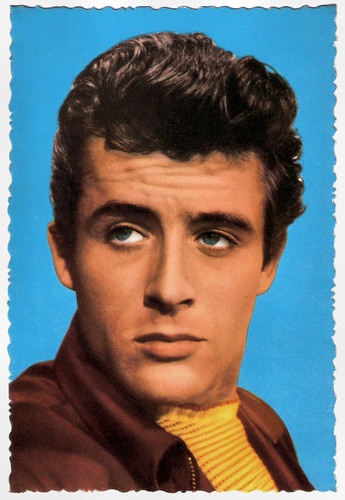
Spanish postcard by Raker, no. 1010.

Spanish postcard by Raker, no. 1084.
One of the most spectacular publicity campaigns in the history of Spanish cinema
José Campos was born José Antonio Campos Boloix in 1936 in Granada, Andalucia. He studied acting at the I.I.E.C., and then made his film debut, benefiting from a certain physical resemblance to the then-recently deceased James Dean.
He was given one of the most spectacular publicity campaigns in the history of Spanish cinema. For his first film, Llama un tal Esteban (Pedro L. Ramírez, 1959), the publicity read: "José Campos is a true star of today's cinema, who will mark an epoch and define a school of acting in world cinema".
However, the professional career of José Campos in no way corresponded to such optimistic perspectives. He developed his film activity mainly in Barcelona in films produced by Ignacio F. Iquino or the brothers Alfonso Balcázar and Jaime Jesús Balcázar.
In the early 1960s, he starred in such Spanish light entertainment films as Solteros de verano/Summer bachelors (Alfonso Balcázar, 1962) and Los castigadores/The punishers (Alfonso Balcázar, 1962).
Campos played a juvenile delinquent in Los desamparados/The Homeless (Antonio Santillán, 1962). He co-starred with Rafael Bardem in La alternativa/The alternative (José María Nunes, 1963). For this film, he also wrote the story.

Spanish postcard by Ediciones Raker, Barcelona, no. 26. José Campos in Solteros de verano/Summer bachelors (Alfonso Balcázar, 1962).

Spanish postcard by Ediciones Raker, Barcelona, no. 299. José Campos in Solteros de verano/Summer bachelors (Alfonso Balcázar, 1962).
A scary and ghastly film with a lot of thrills, chills, and ominous bloodsuckers
In Italy, José Campos appeared in the horror film La cripta e l'incubo/Crypt of the Vampire (Camillo Mastrocinque, 1964) starring Christopher Lee. Though only superficially faithful to Joseph Sheridan Le Fanu's famous novella, 'Carmilla', the film was praised for its consistent visual distinction and unity of mood.
Ma Cortes at IMDb: "A scary and ghastly film with a lot of thrills, chills, and ominous bloodsuckers. Interesting screenplay full of twists and turns."
He appeared in an episode of the popular historical series Diego de Acevedo (Ricardo Blasco, 1966) about Spain during the 19th century. He also appeared in the crime films Yo no soy un asesino/I am not a murderer (José María Zabalza, 1968) and Homicidios en Chicago/Homicides in Chicago (José María Zabalza, 1969).
After a long interval, José Campos returned to the screen with Vivir a mil/Living at a thousand (1976), which he both wrote and directed and which starred his son, Juan Carlos Campos. He then acted in the Spanish comedy Visanteta, estáte quieta/Visanteta, be quiet (Vicente Escrivá, 1979) starring Maria Rosaria Omaggio. He only played a supporting part, credited as Josep Campos.
He had an even smaller, uncredited part in the sex comedy Consultorio sexológico/Sex Clinic (José Antonio Villalba, 1980). His final film was the thriller El enigma del yate/The enigma of the yacht (Carlos Aured, 1983). José Campos died in 2010 in Madrid, Spain. He was 76. His daughter is Marie Cozannet, who also works in the film industry.

Spanish postcard by Ediciones Raker, Barcelona, no. 1032.

Spanish postcard by Ediciones Raker, Barcelona, no. 282. José Campos in Los castigadores/The punishers (Alfonso Balcázar, 1962).
Sources: Ma Cortes (IMDb), Enciclopedia del Cine Español (Spanish), Film Affinity and IMDb.
No comments:
Post a Comment